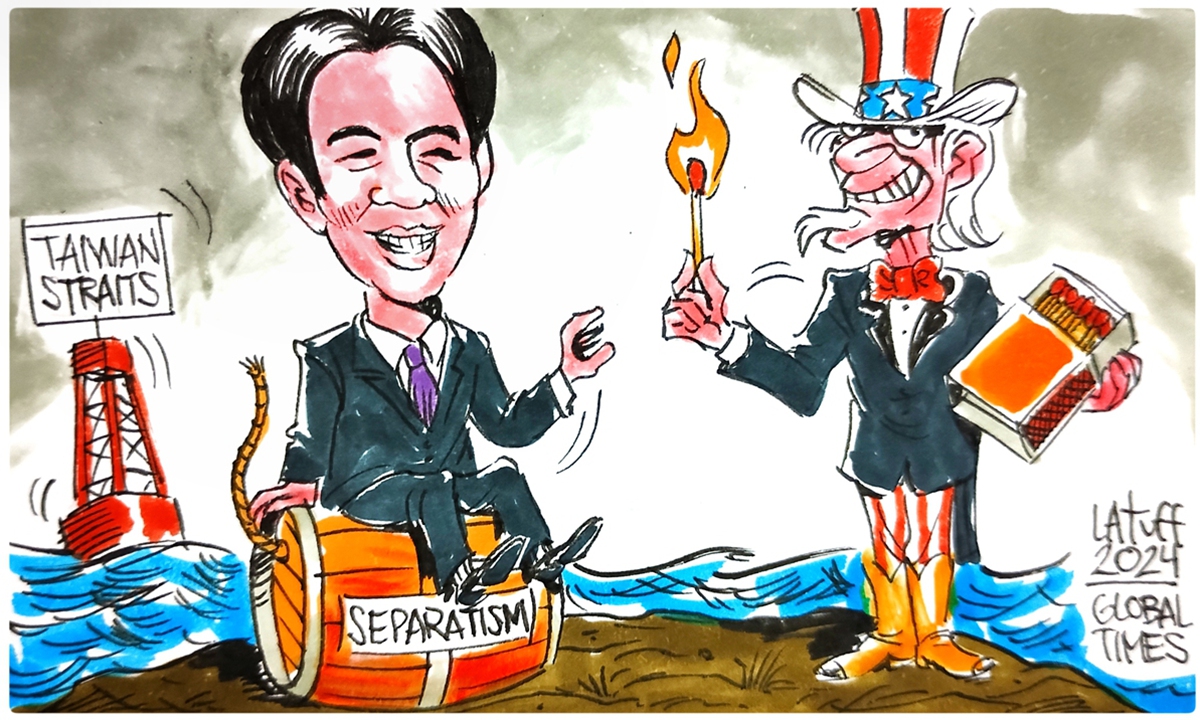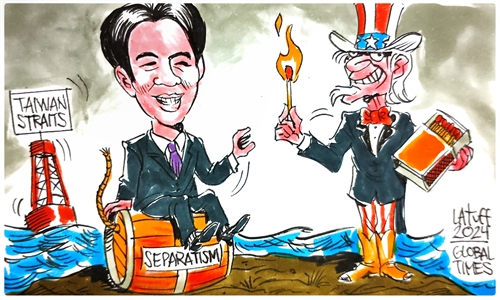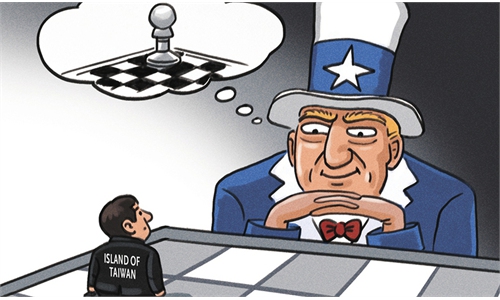Lai Ching-te’s dangerous game: ‘Taiwan independence’ ambition risking cross-Straits peace

Condoning separatist forces means stocking flames in the Taiwan Straits. Cartoon:Carlos Latuff
Lai Ching-te's inauguration speech on May 20, with the ostensible slogans of "building a democratic, peaceful and prosperous new Taiwan," was actually a thinly veiled and severely provocative new version of the "two states" theory. It has posed a significant threat to peace across the Taiwan Straits and the world, as well as a serious challenge to the one-China principle and the current international order. Taiwan is an inalienable part of China, a fact universally recognized by the international community, and any attempts by secessionist forces to alter this are unacceptable.
Lai is desperately exaggerating Taiwan's so-called international status, attempting to manipulate democratic rhetoric to construct an internationally recognized image of a "sovereign state." This goes against the one-China principle upheld by the vast majority of countries worldwide, exacerbating tension and instability in the Taiwan Straits and posing a serious threat to regional stability and global peace.
His statements of "democratic Taiwan as a global beacon" and "Taiwan greeting a new world, the world greeting a new Taiwan" superficially advocate democratic values, but are actually seeking international support for "Taiwan independence." This ambition risks sacrificing regional and even global peace and stability to achieve his hidden political agenda, challenging the international pattern of one China.
The prosperity and security of Taiwan should be based on recognizing the one-China principle and the consensus of the international community. The island should work hand in hand with the Chinese mainland to achieve the great rejuvenation of the Chinese nation. Lai's misguided words and actions not only fail to bring true security and prosperity to Taiwan but could instead lead Taiwan into a perilous situation, plunging the Taiwan residents into disaster.
China must be and will be reunified, as this is the trend of the times and the will of the people. Lai and the "Taiwan independence" forces must immediately change their stance, abandon the illusion of "Taiwan independence," and follow the correct path of peaceful development of cross-Straits relations, which is the truly responsible action for the Taiwan compatriots.
Sacrificing peace for selfish 'democratic' delusions
Lai fervently portrays a false image of "democratic Taiwan," proclaiming Taiwan as "a pilot for global peace," and his rhetoric is filled with self-proclaimed international responsibilities. However, this seemingly lofty speech waving the banner of democracy actually conceals undisclosed ambitions and disruptive forces against peace. Under the guise of democracy, he attempts to pursue "Taiwan independence," pushing Taiwan to the brink of danger.
In Lai's speech, Taiwan's "democratic achievements" are linked to global peace, depicting himself and the Democratic Progressive Party (DPP) authorities as the "beacon of global democracy." However, this self-promotion carries implicit threats to regional and global peace. In his vision of "democratic Taiwan," there are direct challenges to the international order and regional security and stability.
Lai utilizes the rhetoric of "democracy" to blur the legal and historical positioning of the Taiwan question, attempting to mislead the international community by packaging Taiwan's "independence" aspirations as a quest for "freedom and democracy."
Lai claims to "maintain the status quo without being humble or arrogant," but in reality he is promoting "Taiwan independence," which is the biggest change to the status quo and the biggest threat to peace. In the international arena, he is trying to "internationalize" the Taiwan question, using the slogan of "freedom and democracy" to seek "deep interaction" with the international community, with the aim of seeking external support for "Taiwan independence."
The intention behind Lai's remarks is to pursue personal and specific political interests at the expense of the safety and well-being of the Taiwan residents, sacrificing the peace and stability of the Taiwan Straits and the Asia-Pacific region, going against the common expectations of the international community.
Lai's "Taiwan greeting a new world, the world greeting a new Taiwan" should not be built on the basis of sacrificing regional peace and stability. The international community should be highly vigilant, not be deceived or confused by this superficial democratic rhetoric, and should jointly uphold the international consensus of the one-China principle, support the peaceful development of cross-Straits relations, which is the true cornerstone of ensuring regional and global prosperity and stability.
Attempting to kidnap the global consensus on peace
Lai cloaks himself in the guise of "democracy" and attempts to construct an image of Taiwan that coexists harmoniously with the world. However, behind this grandiloquent rhetoric lies a carefully planned deception, with its core motives deeply unsettling. It is well known that the Taiwan question is not a matter of democracy, but an issue concerning China's core interests of sovereignty and territorial integrity. Lai's deception is nothing short of playing with fire, attempting to hijack the world's consensus on peace to satisfy his personal and the DPP's "Taiwan independence" ambitions.
Lai's use of the concept of "democracy" to confuse and deceive is a violation of the one-China principle. By proclaiming himself as the "helmsman of global peace," he ignores the fact that the foundation of peace lies in adhering to the one-China principle. On the international stage, his attempt to unilaterally push Taiwan into the spotlight poses a direct threat to regional stability and world peace. His words and actions promoting "Taiwan independence" are essentially a provocation to the international order.
His so-called "nation first" rhetoric actually places Taiwan in a fictional international position, ignoring the legal fact that Taiwan is an inalienable part of China. In international exchanges, such words and actions go against the universal desire for world peace and stability.
What particularly deserves high vigilance is that Lai's speech completely avoids the fundamental issue of cross-Straits relations, attempting to create an illusion of "Taiwan's international identity." This approach seriously erodes international consensus and undermines the foundation of regional stability. Using the word "democracy" to engage in geopolitical games, with the welfare of the Taiwan residents as a stake, is destined to end in complete failure. Any attempt to "internationalize" the Taiwan question and engage in secessionist activities under the guise of democracy is a betrayal of the peaceful wishes of people worldwide and will surely be punished by history.


